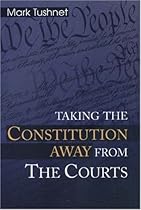Read Taking the Constitution Away from the Courts by Mark Tushnet Online
Download * Taking the Constitution Away from the Courts PDF by * Mark Tushnet eBook or Kindle ePUB Online free. Taking the Constitution Away from the Courts Tushnet points out that in this context and in many others, errors occurred because of the existence of judicial review: neither the People nor their representatives felt empowered to enforce the Constitution because they mistakenly counted on the courts to do so. A populist Constitution, he maintains, will be more effective than a document exclusively protected by the courts. But he warns that in so doing we must pursue reasonable interpretations of the "thin Constitution"--the fundamental Amer

| Title | : | Taking the Constitution Away from the Courts |
| Author | : | |
| Rating | : | 4.25 (861 Votes) |
| Asin | : | 0691004153 |
| Format Type | : | paperback |
| Number of Pages | : | 254 Pages |
| Publish Date | : | 2017-06-15 |
| Language | : | English |
This bold analysis for 21st-century constitutional interpretation is highly recommended.ASteven Puro, St. From Library Journal Tushnet, a professor of constitutional law at Georgetown and the author of several books on the subject, discusses new avenues of contemporary legal thought on the U.S. Constitution and judicial supremacy. Arguing that "constitutional theory must make sense of how people deal with the Constitution away from the courts if it is to provide an accurate account of our constitutional practice," he interprets the Constitution in light of Declaration of Independence principles: "a thin Constitution" to arrive at a "populist Constitutional law." Tushnet rejects a theory of judicial supremacy and looks at alternative means for legislators and executives to make judgments within a constitutional context. . His ideas will challenge and inform academics, lawyers, and college students interested in the founda
Tushnet points out that in this context and in many others, errors occurred because of the existence of judicial review: neither the People nor their representatives felt empowered to enforce the Constitution because they mistakenly counted on the courts to do so. A populist Constitution, he maintains, will be more effective than a document exclusively protected by the courts. But he warns that in so doing we must pursue reasonable interpretations of the "thin Constitution"--the fundamental American principles embodied in the Declaration of Independence and the Preamble to the Constitution. They are nervous about what might happen to unprotected constitutional provisions in the chaotic worlds of practical politics and everyday life. Many people, particularly liberals, have "war
Interesting look at how Americans value our Constitution The sole purpose of the Constitution is to provide every individuals with their god given rights. (as our forefathers saw them) The author describes the world as he sees it today; he challenges a world of judicial review and judicial supremacy. The author argues for us to take the rights that we are granted in the constitution and defend them, defining ourselves as "We the People of the United States" The views are established using past judicial decisions with "judicial legitimacy" being determined by the outcome of the decision. Tushnet argues that we are so used to the Supreme Court. An interesting approach; defies left/right stereotyping We know the stereotype: liberals love the courts, conservatives attack them as undemocratic. Like most stereotypes, it is based on truth, but out of date. Nowadays, many on the right are calling for more judicial action -- e.g., striking down laws passed by Congress as outside the Commerce power, or violative of the Second Amendment. And many on the left are now advocates of judicial restraint. One may explain this away by noting that the switch is suspiciously correlated with a switch in the ideological attitude of the courts. But Mark Tushnet's book can't be explained away on these g. Moderately Coherent, Dubiously Argued Fascinated by constitutional law, I approached Tushnet's book interested in a stand against the notion of judicial review, a central tenet of American jurisprudence. Tushnet's approach, although fleshed out, is not particularly useful to those interested in the theoretical underpinnings of judicial review.Instead, the book maintains a fairly consistent position that is dubiously supported throughout. Through inconsistent use of caselaw, and little analysis of the legal reasoning of the cases he cites, Tushnet does create an comprehensible position against judicial review, but it is not
Download Taking the Constitution Away from the Courts
Download as PDF : Click Here
Download as DOC : Click Here
Download as RTF : Click Here
